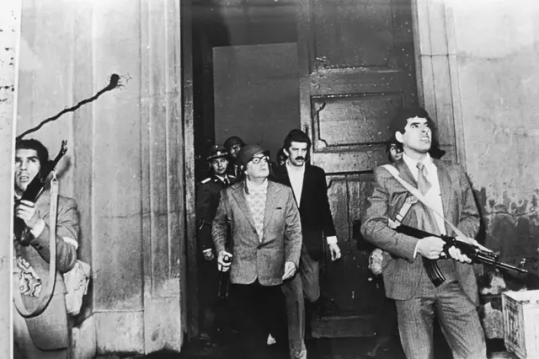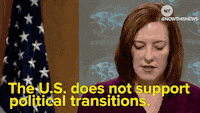#regime change
Text

Today is a good day to remember Salvador Allende, the democratically-elected President of Chile, who died in September 1973. Allende most likely shot himself in the La Moneda Presidential Palace in Santiago when he could no longer fight off the forces of General Augusto Pinochet as they executed a violent coup heavily supported by the United States and Henry Kissinger. Pinochet then ruled Chile as an American-supported "anti-communist" military dictator for nearly two decades in which tens of thousands of Chileans were killed, jailed, or simply disappeared.
Allende, a socialist, was popularly elected as Chile's President with promises to strengthen democracy in Latin America and institute significant economic, education, and health reforms in order to dramatically improve the social welfare of the Chilean people. Some American leaders, like Henry Kissinger, saw him as a potential threat -- a South American version of Fidel Castro -- and the CIA begin laying the groundwork for eventual regime change.
The biggest problem with Allende, in Kissinger's mind, was the very fact that he was freely and democratically elected. In a memo to President Nixon that is still somewhat shocking to read, Kissinger wrote that "Allende was elected legally...He has legitimacy in the eyes of Chileans and most of the world; there is nothing we can do to deny him that legitimacy or claim he does not have it." Kissinger then reminds Nixon that "We are strongly on record in support of self-determination and respect for free election; you are firmly on record for non-intervention in the internal affairs of this hemisphere and of accepting nations 'as they are.'" Then he spends several pages outlining ways in which to undermine, delegitimize, and potentially eliminate "the Problem." After all, as Kissinger wrote shortly before Allende was elected, "I don't see why we need to stand by and watch a country go communist due to the irresponsibility of its people. The issues are much too important for the Chilean voters to be left to decide for themselves."

#History#Salvador Allende#Chile#Latin America#South America#Allende#Augusto Pinochet#Henry Kissinger#Richard Nixon#President Nixon#Nixon Administration#Foreign Policy#CIA#Regime Change#Coups#Kissinger#Death of Henry Kissinger#Politics
247 notes
·
View notes
Text

János Kádár's library room, Budapest, 1990. From the Budapest Municipal Photography Company archive.
109 notes
·
View notes
Text
By Andreína Chávez Alava
For over two decades, Venezuela has been the target of the “free elections” broken record alongside regime change operations and economic sanctions, leaving a long trail of destruction behind. How does the U.S. get away with this “free elections” scam? With the unconditional support of the remorseless corporate media.
#elections#Venezuela#imperialism#media#sanctions#Donald Trump#Genocide Joe#Hillary Clinton#propaganda#regime change#Bolivarian Revolution#Struggle La Lucha
37 notes
·
View notes
Text

What's one more? The most "moral" one...
#palestine#palestinians#gaza#genocide#israeli apartheid#israeli occupation#idf terrorists#iof terrorism#childrens holocaust#free palestine#free gaza#right wing extremism#netanyahu the madman#regime change#war crimes#justice#world court#icj#icc#the hague#settler colonialism#illegal occupation#illegal settlements#land grab#annexation#famine#humanitarian crisis#holy sites#holy land#rafah
9 notes
·
View notes
Text
Every time a black face makes progress for black faces, the United States will surely be there to extinguish that light
#black people#black men#united states history#patrice lumumba#gaddafi#jfk#cia#assassination#regime change#colonizers
29 notes
·
View notes
Link
#Eric Zuesse#Ukraine#Russia#Euromaidan#Baerbock#Crimea#Victoria Nuland#NED#NATO#coup#regime change#SouthFront#Right Sector#referendum#democracy#politics#2023#war
16 notes
·
View notes
Link
Undeserved praise
#Canada#imperialism#neocolonialism#Brian Mulroney#neocons#Palestine#South Africa#apartheid#color revolutions#regime change#Iraq
2 notes
·
View notes
Text
Regime Change in the U.S.: A Taste of Our Own Medicine
I’ve given up on the United States. It’s irreformable. It’s a failed state.
Think about it. As things stand, the U.S. can do nothing but fight wars, close borders, impose sanctions, and fight meaningless culture wars. And even at that, despite the more than $2 billion it spends on “defense” each day, our country can’t win its forever wars. It lost in Vietnam, in Iraq, and Afghanistan. It’s in…

View On WordPress
#Augusto Pinochet#Cornel West#Cuba#Defense Budget#Donald Trump#Fascism#Guatemala#Iran#Marianne Williamson#Regime Change#Resa Pahlavi#U.S. Failed State
2 notes
·
View notes
Photo

#iran revolution#opiran#free iran#iran protests#mahsa amini#human rights#regime change#death to dictatorship#down with the islamic republic#freedom#woman life freedom
20 notes
·
View notes
Text

Checkpoint Charlie, Berlin, 1990. From the Budapest municipal photography company archive.
56 notes
·
View notes
Link
By Raúl Antonio Capote
The United States believes it is more necessary than ever to control its “backyard” to subdue the restless nations of the continent in any way possible. Bolivia plays an extremely important role due to its geographic location and the enormous wealth of its minerals in the soil.
These are the reasons this nation is in the crosshairs of unconventional warfare to bring about a regime change that favors the interests of the empire. If we follow, step by step, what is happening today in the South American sister nation, we will see that the tactic used in 2019 is being repeated.
#Bolivia#regime change#counterrevolution#imperialism#MAS#Luis Arce#Latin America#coup#Evo Morales#Struggle La Lucha
26 notes
·
View notes
Text
56 percent of all UK voters are in favour of a ban on sending weapons to Israel(...)
59% of voters say that Israel is violating human rights in Gaza.
#palestine#palestinians#israeli apartheid#israeli occupation#free palestine#free gaza#gaza genocide#genocide#war crimes#arms embargo#uk#childrens holocaust#idf terrorists#iof terrorism#justice#right wing extremism#illegal settlements#ethnic cleansing#humanitarian crisis#famine#world central kitchen#aid workers#mass murder#netanyahu the madman#rafah#regime change#icj#icc#human rights#support for palestine
4 notes
·
View notes
Text
"the nihilistic eye deliberately advances sensory and mental detachment and alienation"
~Pallasmaa, The Eyes of the Skin: Architecture and the Senses, 1996.
Ergo: The next time someone quotes us as "devolving into the generation of nihilism" tell them all things seen, before they are understood, must be propagated by a greater power in order to understand them. In this case, neoliberalism is that framing power. And we are born blinded to its effects. And then we are taught to see through the cracks and told not to call this reality damaged.
It's easy to fear the youth will turn to nihilism, it's harder to stop that turn if all the path makers erect barriers on the one side, and statues on the other and tell us we'll all grow up to be conservatives too one day--because that's the only path they don't obstruct.
#politics#architecture#anti capitalism#fuck neoliberals#regime change#anarchism is furthering yourself through knowledge#freepalastine🇵🇸#free congo#free sudan
2 notes
·
View notes
Text
youtube
3 notes
·
View notes
Text
Why Civil Resistance Works - Erica Chenoweth
@auronlu - here is info I mentioned earlier to you. Also tagging @thehungrycity because I cannot remember if I actually posted/sent you this stuff too but I have mentioned it and, well, here it is!
---
Erica Chenoweth and Maria Stephan performed a large study that used the entire 20th century history of regime change, including failed attempts at regime change. They found that nonviolent resistance was twice as likely to achieve the goal of removing a regime than armed, violent conflict.
Erica Chenoweth was featured in an hour long podcast interview on her work here: How to Change the World. (Additional references to her work are also available on that link)
Book: Why Civil Resistance Works: The Strategic Logic of Nonviolent Conflict. Erica Chenoweth and Maria J. Stephan, Columbia University Press, 2012.
Back of book blurb:
For more than a century, from 1900 to 2006, campaigns of nonviolent resistance were more than twice as effective as their violent counterparts in achieving their stated goals. By attracting impressive support from citizens, whose activism takes the form of protests, boycotts, civil disobedience, and other forms of nonviolent noncooperation, these efforts help separate regimes from their main sources of power and produce remarkable results, even in Iran, Burma, the Philippines, and the Palestinian Territories.
Combining statistical analysis with case studies of specific countries and territories, Erica Chenoweth and Maria J. Stephan detail the factors enabling such campaigns to succeed and, sometimes, causing them to fail. They find that nonviolent resistance presents fewer obstacles to moral and physical involvement and commitment, and that higher levels of participation contribute to enhanced resilience, greater opportunities for tactical innovation and civic disruption (and therefore less incentive for a regime to maintain its status quo), and shifts in loyalty among opponents' erstwhile supporters, including members of the military establishment.
Chenoweth and Stephan conclude that successful nonviolent resistance ushers in more durable and internally peaceful democracies, which are less likely to regress into civil war. Presenting a rich, evidentiary argument, they originally and systematically compare violent and nonviolent outcomes in different historical periods and geographical contexts, debunking the myth that violence occurs because of structural and environmental factors and that it is necessary to achieve certain political goals. Instead, the authors discover, violent insurgency is rarely justifiable on strategic grounds.
About the Author
Erica Chenoweth is an assistant professor at the Josef Korbel School of International Studies at the University of Denver and an Associate Senior Researcher at the Peace Research Institute of Oslo. Previously she taught at Wesleyan University and held fellowships at Harvard, Stanford, and the University of California at Berkeley.
Maria J. Stephan is a strategic planner with the U.S. Department of State. Formerly she served as director of policy and research at the International Center on Nonviolent Conflict (ICNC) and as an adjunct professor at Georgetown University and American University. She has also been a fellow at the Kennedy School of Government's Belfer Center for Science and International Affairs.
#non violence#regime change#democracy#also: this was interesting to me for so many reasons#not just the research itself and its obvious implications#but also applying this to media theory#which is something that belongs in a completely different post
17 notes
·
View notes
